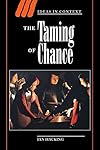

Auf ein Miniaturbild klicken, um zu Google Books zu gelangen.
|
Lädt ... The Taming of Chance (1990)von Ian Hacking

Keine aktuelle Diskussion zu diesem Buch.  If you look at the table of contents in this book, you'll see that it has 23 chapters. Nearly all of them are less than 10 pages long, with uninformative headings like "Bureaux", "Regimental chests" and "The mineralogical conception of society". This is a good indication of how fragmented and confusing this book is. You wouldn't know it from the strange headings, but each chapter deals with some particular field of inquiry where statistical methods and statistical thinking became prominent in the 19th century. That may sound interesting, but unfortunately the author just dumped a truckload of short biographies into every chapter. Person A studied this and that, worked here and there and was in regular contact with persons B and C. They in turn studied this and that and thought so and so about chance and statistics. It goes on like this for the entire book, detail after detail after detail. But these collected details aren't very interesting without a broader perspective. A good account of the history of ideas should include some generalizations too. The author actually states on page 1 that his intention is to argue that two 19th century transformations are connected. The first transformation is the idea of a world which is regular without being causally determined. The second transformation is the emergence of a society governed by statistical information. So apparently his intention was to make a general argument, but he really fails miserably in putting it together. I just finished the book and I don't recall a single passage where he would have clearly argued the connection he claims on page 1. Whereas good books in the history of ideas contain a general analysis supported by selected examples, this one seems to contain only examples. There's no general argument so readers are forced to draw their own conclusions. Maybe this book will have some appeal to people with biographical interests. But I like books that concentrate on broader developments which took place above and beyond any particular researcher. I was disappointed to find that this book did not offer anything on that front. So if you're looking to understand the growth of statistics as a general phenomenon, you'll have too look somewhere else. Zeige 2 von 2 keine Rezensionen | Rezension hinzufügen
Gehört zur ReiheIdeas in Context (17) Bemerkenswerte Listen
In this important study Ian Hacking continues the enquiry into the origins and development of certain characteristic modes of contemporary thought undertaken in such previous works as the best-selling The Emergence of Probability. Professor Hacking shows how by the late-nineteenth century it became possible to think of statistical patterns as explanatory in themselves, and to regard the world as not necessarily deterministic in character. In the same period the idea of human nature was displaced by a model of normal people with laws of dispersion. These two parallel transformations fed into each other, so that chance made the world seem less capricious: it was legitimated because it brought order out of chaos. Combining detailed scientific historical research with characteristic philosophic breadth and verve, The Taming of Chance brings out the relations between philosophy, the physical sciences, mathematics and the development of social institutions, and provides a unique and authoritative analysis of the 'probabilisation' of the western world. Keine Bibliotheksbeschreibungen gefunden. |
Aktuelle DiskussionenKeineBeliebte Umschlagbilder
 Google Books — Lädt ... Google Books — Lädt ...GenresMelvil Decimal System (DDC)123.3Philosophy and Psychology Philosophy Of Humanity Chance, Free Will, And Necessity ChanceKlassifikation der Library of Congress [LCC] (USA)BewertungDurchschnitt: (3.72) (3.72)
Bist das du?Werde ein LibraryThing-Autor. |
||||||||||||||||||||||||||||||||||||||||||||||||||||||||||||||||||||||||||||||||||||||||||||||||||||||||||||||||||||||||